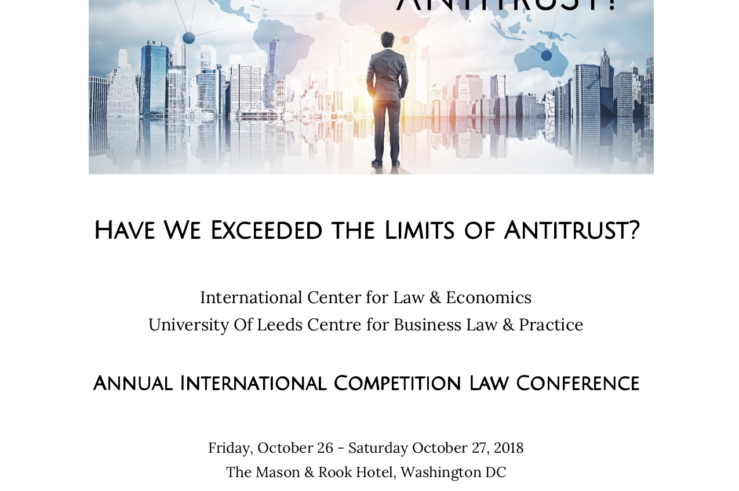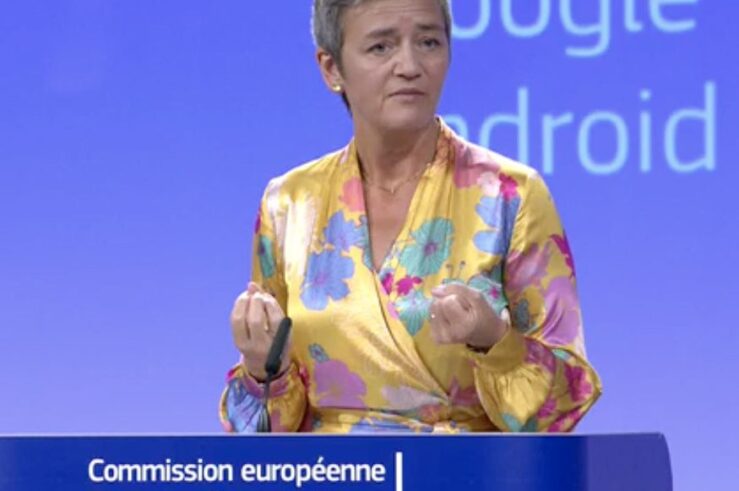FTC v. Qualcomm: Innovation and Competition
Just days before leaving office, the outgoing Obama FTC left what should have been an unwelcome parting gift for the incoming Commission: an antitrust suit against Qualcomm. This week the FTC — under a new Chairman and with an entirely new set of Commissioners — finished unwrapping its present, and rested its case in the trial begun ... FTC v. Qualcomm: Innovation and Competition
Don’t Miss the 2018 ICLE/Leeds Competition Law Conference: Have We Exceeded the Limits of Antitrust?
REGISTER HERE for the much-anticipated 2018 ICLE/Leeds competition law conference, this Friday and Saturday in Washington, DC. NB: We’ve been approved for 8 credit hours of VA MCLE The conference agenda is below. We hope to see you there!
The DOJ’s Approval of the CVS/Aetna Merger and Vertical Innovation by Incumbents
Last week, the DOJ cleared the merger of CVS Health and Aetna (conditional on Aetna’s divesting its Medicare Part D business), a merger that, as I previously noted at a House Judiciary hearing, “presents a creative effort by two of the most well-informed and successful industry participants to try something new to reform a troubled ... The DOJ’s Approval of the CVS/Aetna Merger and Vertical Innovation by Incumbents
Putting Politics over Policy at the FCC
FCC Commissioner Rosenworcel penned an article this week on the doublespeak coming out of the current administration with respect to trade and telecom policy. On one hand, she argues, the administration has proclaimed 5G to be an essential part of our future commercial and defense interests. But, she tells us, the administration has, on the ... Putting Politics over Policy at the FCC
Amazon-Whole Foods symposium wrap-up
On Tuesday, August 28, 2018, Truth on the Market and the International Center for Law and Economics presented a blog symposium — Is Amazon’s Appetite Bottomless? The Whole Foods Merger After One Year — that looked at the concerns surrounding the closing of the Amazon-Whole Foods merger, and how those concerns had played out over ... Amazon-Whole Foods symposium wrap-up
The Amazon-Whole Foods merger: Natural and organic competition in the evolving grocery industry
What actually happened in the year following the merger is nearly the opposite: Competition among grocery stores has been more fierce than ever. “Offline” retailers are expanding — and innovating — to meet Amazon’s challenge, and many of them are booming. Disruption is never neat and tidy, but, in addition to saving Whole Foods from potential oblivion, the merger seems to have lit a fire under the rest of the industry. This result should not be surprising to anyone who understands the nature of the competitive process. But it does highlight an important lesson: competition often comes from unexpected quarters and evolves in unpredictable ways, emerging precisely out of the kinds of adversity opponents of the merger bemoaned.
The EU’s Google Android antitrust decision falls prey to the nirvana fallacy
Today the European Commission launched its latest salvo against Google, issuing a decision in its three-year antitrust investigation into the company’s agreements for distribution of the Android mobile operating system. The massive fine levied by the Commission will dominate the headlines, but the underlying legal theory and proposed remedies are just as notable — and ... The EU’s Google Android antitrust decision falls prey to the nirvana fallacy
For LabMD, the Devil Is in the Not-So-Well Specified Details
The Eleventh Circuit’s LabMD opinion came out last week and has been something of a rorschach test for those of us who study consumer protection law. Neil Chilson found the result to be a disturbing sign of slippage in Congress’s command that the FTC refrain from basing enforcement on “public policy.” Berin Szóka, on the ... For LabMD, the Devil Is in the Not-So-Well Specified Details
More on a possible Comcast/Fox deal: Reports of the death of vertical mergers have been greatly exaggerated
A few weeks ago I posted a preliminary assessment of the relative antitrust risk of a Comcast vs Disney purchase of 21st Century Fox assets. (Also available in pdf as an ICLE Issue brief, here). On the eve of Judge Leon’s decision in the AT&T/Time Warner merger case, it seems worthwhile to supplement that assessment by ... More on a possible Comcast/Fox deal: Reports of the death of vertical mergers have been greatly exaggerated
A preliminary assessment of the relative antitrust risk of a Comcast vs Disney purchase of 21st Century Fox assets
As has been rumored in the press for a few weeks, today Comcast announced it is considering making a renewed bid for a large chunk of Twenty-First Century Fox’s (Fox) assets. Fox is in the process of a significant reorganization, entailing primarily the sale of its international and non-television assets. Fox itself will continue, but ... A preliminary assessment of the relative antitrust risk of a Comcast vs Disney purchase of 21st Century Fox assets
The net neutrality CRA may be the most tedious piece of political theater ever
At this point, only the most masochistic and cynical among DC’s policy elite actually desire for the net neutrality conflict to continue. And yet, despite claims that net neutrality principles are critical to protecting consumers, passage of the current Congressional Review Act (“CRA”) disapproval resolution in Congress would undermine consumer protection and promise only to ... The net neutrality CRA may be the most tedious piece of political theater ever
The Tariff Act is indeed protectionist — and that’s how Congress wants it
Although not always front page news, International Trade Commission (“ITC”) decisions can have major impacts on trade policy and antitrust law. Scott Kieff, a former ITC Commissioner, recently published a thoughtful analysis of Certain Carbon and Alloy Steel Products — a potentially important ITC investigation that implicates the intersection of these two policy areas. Scott was ... The Tariff Act is indeed protectionist — and that’s how Congress wants it








